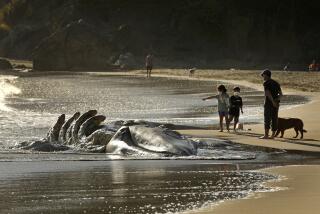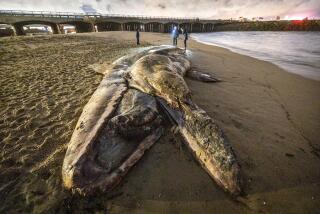Japanese and Saving Whales
- Share via
I commend the efforts of Samuel LaBudde, the research biologist who works with Earth Island Institute, to help eliminate the dolphin deaths connected to tuna fishing by our nation and others (“Whaling Commission Urged to Join Battle to Halt Killing of Dolphins,” Part I, June 11).
Dolphins and whales, superior marine mammals who contribute absolutely nothing negative to the planet and whose deaths are completely unnecessary, both need positive international support. Until tuna-catching methods no longer involve sea mammal deaths, no one in good conscience should purchase tuna products.
And until the Japanese, whose spokesman Kazuo Shima, complained in the article about the “clash of cultures” in the International Whaling Commission, see that the debate is not really between meat-eating and marine-resource nations, the stalemate will serve as an excuse for the killing to continue. “We are the minority” in the IWC, he said.
Shima’s “minority nation” gripe coupled with the bogus “research” ploy--” . . . It is necessary to catch and kill . . . whales in order to determine whether populations are increasing or decreasing”--should be seen for what they are: a way for whalers to profit by sales of a luxury-level edible to a small portion of Japanese consumers.
As for U.S. tuna consumption, though it is not a luxury food, the cost in dolphin deaths (30,000 annually by U.S. fishermen alone) outweighs the industry’s fears of going broke trying to reduce dolphin kills; they have the technology to harvest without killing. If the price of sandwiches and cat food rises to cover full implementation of this technology, so be it.
JOANNE HEDGE
Hollywood
More to Read
Sign up for Essential California
The most important California stories and recommendations in your inbox every morning.
You may occasionally receive promotional content from the Los Angeles Times.













